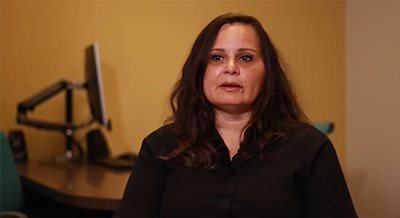In late 2020, Melanie Ramirez started to feel depressed and drained of energy. When pressure in her head limited her everyday activities, she knew something was wrong. “I was pretty much being a couch potato … like the light was on but nobody was home,” she said.
Her sister noticed the change in her once-vibrant and energetic younger sister and even accompanied Ramirez on multiple doctor visits.
But the doctors were stumped, suggesting Ramirez's depression could be a byproduct of early menopause at the age of 46, or perhaps a hard-to-pin-down autoimmune disease.

Seeking a specialist
Ramirez's sister was not satisfied and ultimately pushed her to investigate the cause further with an MRI. The scan revealed a large tumor and she was referred to Dr. Nicholas Levine, one of the Central Valley’s top neurosurgeons.
“The meningioma was large and where it was growing had caused her to have dysfunction in her frontal lobes so her personality had changed,” noted Dr. Levine.
A meningioma is a slow-growing tumor that forms in the outer three layers of tissue that cover and protect the brain just under the skull. In Ramirez's case, the tumor was about the size of a grapefruit and was likely affecting parts of her brain responsible for personality and decision-making.
Treating brain tumors
Meningiomas account for more than 30% of all brain tumors and are more likely to occur in women. Depression and anxiety, especially if either develops suddenly, and headaches may be early symptoms of a meningioma.
With time, the tumor and symptoms may worsen, so surgery is often the primary course of treatment.
Right care at the right time
Ramirez had her surgery at Community Regional Medical Center by the area’s top neuroscience team, which performs 41% of the brain cancer surgeries in a seven-county region in the Valley.
Dr. Levine successfully removed the entire mass in February 2021. Ramirez has since returned to her normal life and encourages other people who are feeling “off” to “keep pushing and pushing until you get an answer.”
“She has regained her life,” Dr. Levine said about Ramirez. “She’s interacting with her family again. She’s no longer seen as depressed and withdrawn – she has a sparkle back in her eyes.”
These efforts are all part of Community Health System’s mission to increase access to care and create a healthier community for all so patients like Ramirez can receive care and support close to home.
See this story on MedWatch Today
Community’s Commitment to Making Care Accessible
Our mission of improving the health of our region is dependent on continually enhancing our medical expertise and investing in research and technology so everyone, regardless of their circumstance, has access to top-level care. We aim to rank among the nation’s top hospitals in delivering measurable quality care and investing in best practices and innovative technology. Read more stories.


.jpg)
